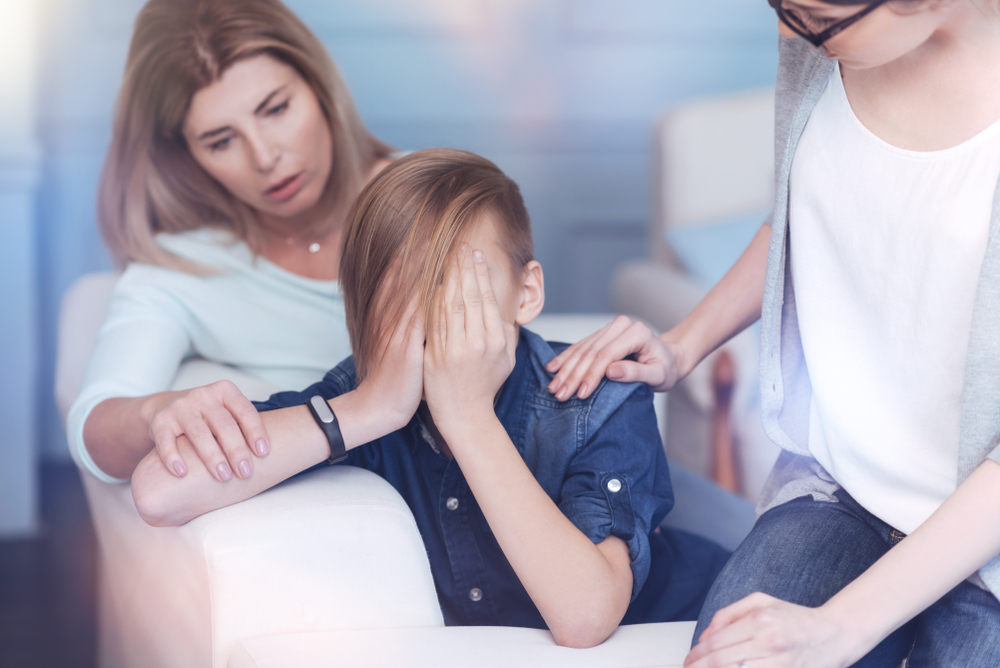Anxiety is a normal emotion and a healthy reaction to stress. According to the Mayo Clinic, having occasional feelings of anxiety is an unavoidable part of life. The medical definition of anxiety provided in the Merriam-Webster Dictionary is “an abnormal and overwhelming sense of apprehension and fear often marked by physical signs (such as tension, sweating, and increased pulse rate), by doubt concerning the reality and nature of the threat, and by self-doubt about one’s capacity to cope with it.” Psychology Today explains that “anxiety is built into our primate origins as a warning system,” and that there are several benefits to experiencing occasional anxiety. Nevertheless, an adolescent experiencing symptoms of anxiety that interfere with his or her ability to function in his or her daily life may be struggling with an anxiety disorder. Teenage anxiety disorders are highly common. The National Alliance on Mental Illness (NAMI) asserts: “Anxiety disorders are a group of related conditions, each having unique symptoms. However, all anxiety disorders have one thing in common: persistent, excessive fear or worry in situations that are not threatening.” There are currently five distinct types of anxiety disorders listed in the Diagnostic and Statistical Manual of Mental Disorders, Fifth Edition (DSM-5). They include the following: generalized anxiety disorder (GAD), obsessive-compulsive disorder (OCD), panic disorder, post-traumatic stress disorder (PTSD) and social anxiety disorder (also known as social phobia). There are many treatment options for teenagers diagnosed with an anxiety disorder.
Treatment
There are a variety of approaches to treating teenagers with an anxiety disorder. The two main treatments for an anxiety disorder include psychotherapy and medication, and they are not mutually exclusive. Any young person in treatment will require a nuanced treatment plan that carefully incorporates the best possible therapeutic methods and are specifically geared to each teen’s personal needs. There are different types of therapeutic modalities that could be integrated into one’s treatment plan, such as cognitive behavioral therapy (CBT), dialectical behavior therapy (DBT), expressive arts therapy, and interpersonal psychotherapy (IPT). Some adolescents diagnosed with an anxiety disorder may benefit from including medication into the treatment plan, in conjunction with various therapeutic methods. The different types of medications prescribed for teenage anxiety disorders include selective serotonin reuptake inhibitors (SSRIs), serotonin and norepinephrine reuptake inhibitors (SNRIs) and norepinephrine and dopamine reuptake inhibitors (NDRIs). If medication is necessary, the providing mental health clinician should consult with an adolescent psychiatrist as well collaborate with the teenager’s parents both for permission and continued involvement in the treatment process. Every young person is unique and will respond distinctly to the various treatment options available.
For Information and Support
Every family in need of mental health treatment must select a program that will best suit the needs of their family. When one member of a family struggles, it impacts everyone in the family unit. To maximize the benefits of treatment we work closely with the entire family to ensure that everyone is receiving the support they need through these difficult times. Seeking help is never easy, but you are not alone! If you or someone you know needs mental health treatment, we strongly encourage you to reach out for help as quickly as possible. It is not uncommon for many mental health difficulties to impact a person’s life, long term. Pursuing support at the beginning of one’s journey can put the individual in the best position to learn how to manage themselves in a healthy way so they can go on to live happy and fulfilling lives.
OUR KNOWLEDGEABLE ADMISSIONS TEAM CAN BE REACHED 24/7 AT INFO@PACIFICRTC.COM OR CALL: 800-531-5769 We are available to answer any questions you may have regarding mental health treatment and our residential program, anytime. Contact us today using the form to the right.






